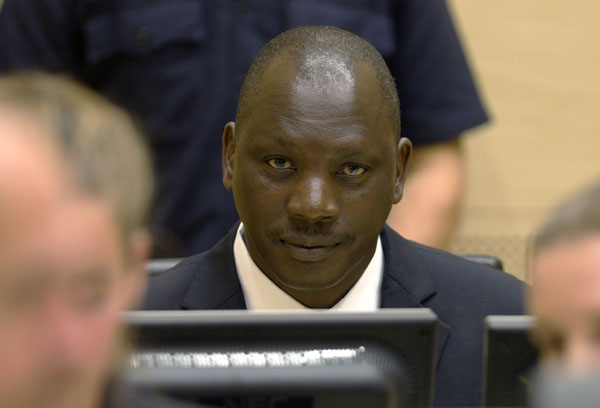
Concluding its first-ever trial, a panel of judges at the International Criminal Court issued a verdict in the case of Thomas Lubanga today, finding him guilty of recruiting child soldiers.
After a three-year trial, it is a landmark decision not only because it tested out the 10-year-old court’s process from start to finish but because it placed the crime of recruiting child soldiers at the forefront of an international trial. “Perhaps today’s verdict of guilty provides some measure of comfort for the victims of Mr. Lubanga’s actions,” said actress Angelina Jolie, who attended the reading of the verdict at The Hague. “Most of all it sends a strong message against the use of child soldiers.”
The Congolese rebel leader was charged with war crimes in 2006 for his alleged role in enlisting and conscripting children under the age of 15 to serve as fighters, body guards, and sex slaves during the conflict in the Ituri region of the Democratic Republic of Congo that spanned from 1999 to 2007 and left an estimated 60,000 people dead. The court alleged that Lubanga was the founder and president of the Union des Patriotes Congolais, or UPC, and served as the commander-in-chief of the Forces Patriotiques pour la Libération du Congo, or FPLC. Lubanga was arrested in Kinshasa in 2006 under a sealed arrest warrant and, shortly thereafter, transferred to The Hague.
In a 2009 interview with the Enough Project, ICC Deputy Prosecutor Fatou Bensouda, who worked closely on the case, provided some background to the trial that had begun a few months earlier. Thomas Lubanga was originally trained as a psychologist, Bensouda explained:
He wanted more, and he wanted an army. He preyed on children. For years in Ituri, we’ve seen, according to the evidence we presented, that he was a demi-god for people and had power over life and death over children. (…)
Children, very brave children, have been to the court. They came and gave their stories, and they told us how they have been forced to rape, how they have been forced to kill, and how they have been forced to pillage, and how they have even been forced to kill other children who are trying to escape. We have also been able to show how girl soldiers have been transformed into sexual slaves, whilst they have been abducted, and sometimes they’re even given as rewards to commanders.
The court’s first trial contended with two major procedural hurdles that nearly resulted in the release of Lubanga; the defense maintained its opposition to the handling of those incidents even in its closing arguments. Both instances involved the prosecution’s willingness to disclose information it claimed could put the sources at risk. But judges and the defense questioned the legitimacy of some of the testimonies—doubts that lingered even as the verdict was announced, though the bulk of the evidence convinced the three judges of Lubanga’s guilt. Presiding judge Adrian Fulford criticized the prosecution for approaching witnesses through intermediaries, saying three intermediaries "persuaded, encouraged, or assisted witnesses to give false evidence."
Still, the historic nature of the first case’s culmination brought accolades for the ICC today and prompted calls for the United States to reconsider its engagement with the court. The Washington Working Group on the ICC, or WICC, sent a letter to every member of Congress today, signed by 12 rights groups, including the Enough Project. The letter noted:
The U.S. has long supported accountability for perpetrators of mass atrocities—a conviction that dates back to the Nuremberg trials. However, current U.S. legislation limits U.S. cooperation with and funding for the Court, except for very limited circumstances. As the Court has matured, now is the time for the U.S. to consider an evolution of its relationship with the ICC as well.
Next comes the sentencing of Lubanga, which will take place during another hearing soon. Lubanga could face life imprisonment. The court cannot impose the death penalty. The ICC is winding down its second trial as well—the case of Germain Katanga and Mathieu Ngudjolo Chui. In May, judges are set to hear closing arguments in the trial of the two Congolese alleged rebel commanders also linked to the conflict in Ituri.

